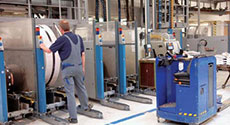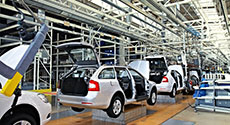ISO Series
|
| |
 |
|
QUALITY MANAGEMENT SYSTEM (QMS)
(ISO 9001)
Expectations of Customers are growing and they are becoming more sophisticated and better informed. For any business, the only way to keep up is to offer a commitment to quality. In fact any organization, whatever their size or type of industry, they can give themselves a secure future by introducing a quality management system (QMS)such as the ISO 9001.
Read More |
| |
|
| |
 |
|
ENVIRONMENTAL MANAGEMENT SYSTEM (EMS)
(ISO 14001)
A company's environmental performance can have a significant impact on its success. ISO 14001 is the internationally recognized standard for Environmental Management Systems (EMS). An Environmental Management System provides a framework for managing environmental responsibilities so they become more efficient and more integrated into overall business operations.
Read More |
| |
|
| |
 |
|
OCCUPATIONAL HEALTH AND SAFETY (OHS) MANAGEMENT SYSTEM
(ISO 45001)
Health and safety at work is an issue affecting all businesses. Implementing an occupational health and safety (OHS) management system is now a legal requirement in many countries. How do you keep up with legislation and set up a system that protects the staff and the Organisation? The answer is to introduce a management system that can reduce the risk of accidents, litigation and downtime.
Read More |
| |
|
| |
 |
|
FOOD SAFETY MANAGEMENT SYSTEM
(ISO 22000)
Safe food is critical for consumers and businesses.
While much of our food supply is safe, several recent high profile cases around the world underline the potential danger of food-borne illness to consumers, employees and brand value. A few recent examples include BSE infected beef, the salmonella contamination of poultry and eggs and high levels of lister in dairy products.
Read More |
| |
|
| |
 |
|
QUALITY MANAGEMENT SYSTEM (QMS) IN MEDICAL DEVICES
(ISO 13485)
ISO 13485, published in 2003, and now fully recognized in many countries, is based on the ISO 9001 process model approach. These standards provide a good base model, recognised by the Global Harmonization Task Force (GHTF), for compliance with the European Union (EU) CE Marking medical device directives, Health Canada CMDCAS, Taiwan Medical Device Regulations, Japan JPAL and other international requirements.
Read More |
| |
|
| |
 |
|
INFORMATION SECURITY MANAGEMENT SYSTEM (ISO 27001)
ISO 27001 establishes guidelines and general principles for initiating, implementing, maintaining, and improving information security management in an organization. The objectives outlined provide general guidance on the commonly accepted goals of information security management.
Read More |
| |
|
| |
 |
|
QUALITY MANAGEMENT SYSTEM IN AUTOMOTIVE INDUSTRIAL
(ISO/TS 16949)
The ISO/TS16949 is an ISO technical specification aiming to the development of a quality management system that provides for continual improvement, emphasising defect prevention and the reduction of variation and waste in the supply chain. It is based on the ISO 9001and the first edition was published in March 2002 as ISO/TS 16949:2002.
Read More |
| |
|
| |
 |
|
GOOD MANUFACTURING PRACTICE(GMP)
Pre-requisite programmes such as GAP, GMP and GHP must be working effectively within a commodity system before HACCP is applied. If these pre-requisite programmes are not functioning effectively then the introduction of HACCP will be complicated, resulting in a cumbersome, over-documented system.
Read More |
| |
|
| |
| |
 |
|
INFORMATION TECHNOLOGY MANAGEMENT SYSTEM (ISO 20000)
ISO/IEC 20000 is the first worldwide standard specifically aimed at IT Service Management. It describes an integrated set of management processes for the effective delivery of services to the business and its customers.ISO/IEC 20000 is aligned with and complementary to the process approach defined within ITIL® from the Office of Government Commerce (OGC).
Read More |
| |
|
| |
 |
|
ENERGY MANAGEMENT STANDARD (ISO 50001)
Since publication of ISO 50001 last year, implementation and certification to ISO’s new energy management standard is gaining pace around the world. Statistics to the end of January 2012 (compiled by Reinhard Peglau, Senior Scientific Officer on Environmental Management at the German Federal Environment Agency), indicated that about 100 organizations in 26 countries had already achieved certification, and are reaping the benefits in increased energy efficiency, reduced costs and improved energy performance.
Read More |
| |
|
|
|
|

